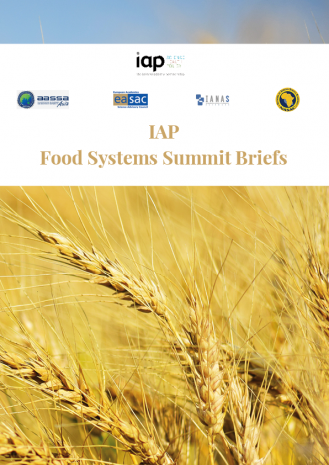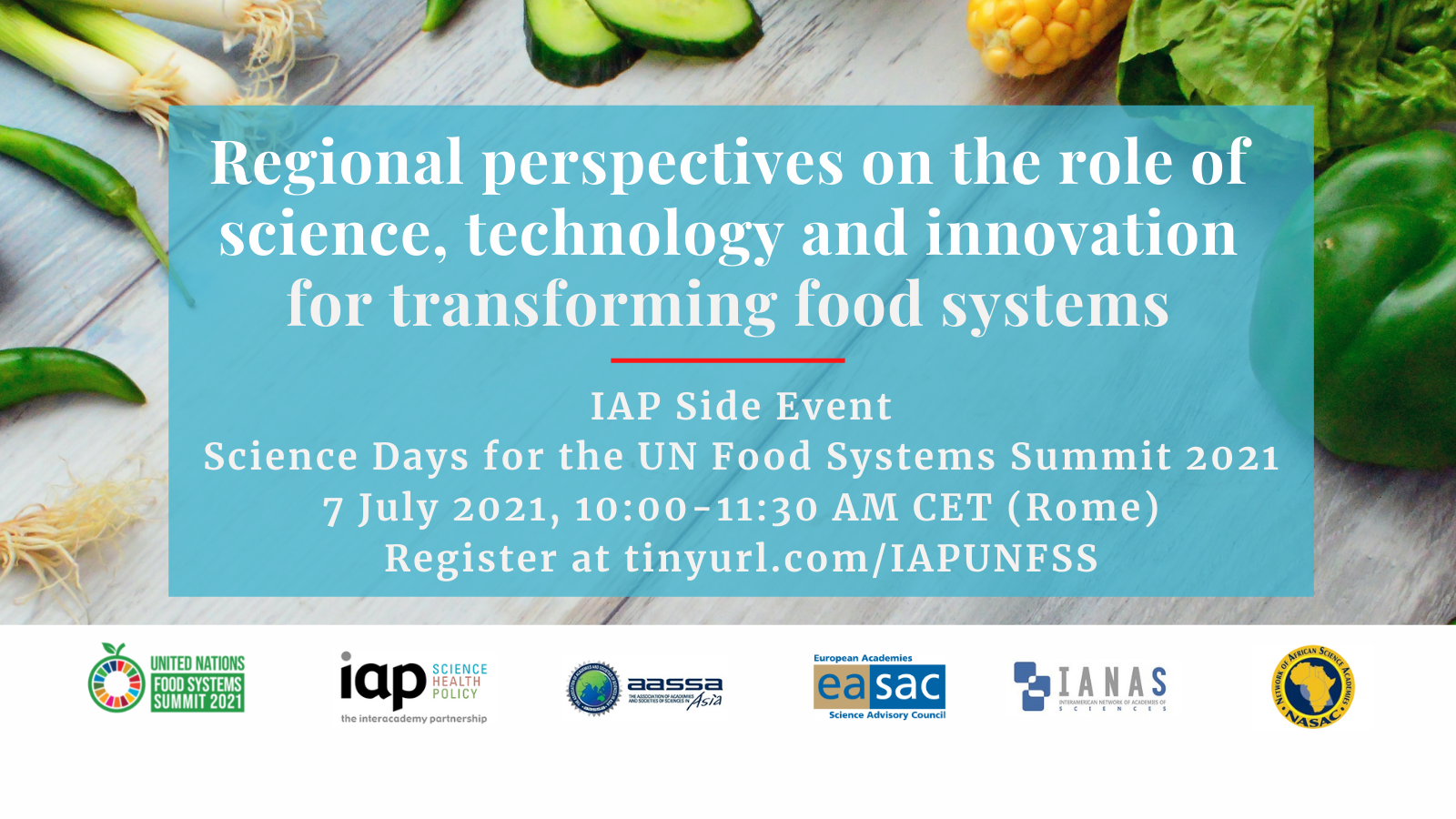See the Agenda
The InterAcademy Partnership (IAP) with its regional academy networks brings together evaluation from Africa, Asia, the Americas and Europe to compare scientific opportunities for delivering sustainable, healthy diets.
Presenters described recent assessments in briefs prepared for the United Nations Food Systems Summit (UN FSS), drawing on comprehensive previous analysis for IAP. The urgency to transform food systems is increased by the growing impacts of climate change and another recent crisis, such as COVID-19.Strengthening research and its uptake as a resource for innovation and to inform practice must be accompanied by better use of the transdisciplinary science base to advise policy making, integrated locally, regionally and globally.

- Technical remarks and agenda Peter McGrath, Coordinator, InterAcademy Partnership (IAP)
- Introduction to IAP and its project on Food and Nutrition Security and Agriculture Volker ter Meulen, Special Advisor, IAP; German National Academy of Sciences, Leopoldina
- The role of science, technology, and innovation for transforming food systems in Africa Sheryl Hendriks, Member, UN FSS Scientific Group; Professor Of Food Security, Department Of Agricultural Economics, Extension And Rural Development, University Of Pretoria, South Africa
- The role of science, technology, and innovation for transforming food systems in Latin America and the Caribbean Elizabeth Hodson de Jaramillo, Member, UN FSS Scientific Group; Emeritus Professor, Pontificia Universidad Javeriana, Colombia; Member, Colombian Academy Of Exact, Physical And Natural Sciences And Inter American Network Of Academies Of Sciences (IANAS)
- The role of science, technology, and innovation for transforming food systems in Asia Paul J. Moughan, Distinguished Professor, Riddet Institute, Massey University, Palmerston North, New Zealand
- The role of science, technology, and innovation for transforming food systems in Europe Claudia Canales Holzeis, Consultant, IAP Project on Food and Nutrition Security and Agriculture; Chief Executive, Kirkhouse Trust
- The role of science, technology, and innovation for transforming food systems globally Robin Fears, Biosciences Programme Director, European Academies’ Science Advisory Council (EASAC)
Panel discussion with presenters and discussants
- Moderator: Peter McGrath
- Chibuike Udenigwe, Professor and University Research Chair, The School Of Nutrition Sciences, University Of Ottawa, Canada; Member, Global Young Academy (GYA)
- Frank Sperling, Senior Project Manager, Integrated Biosphere Futures Research Group, Biodiversity And Natural Resources Program, International Institute For Applied Systems Analysis (IIASA) Member, Indian National Science Academy (INSA)
Resource:
- Earlier in 2021, IAP was invited by the UN FSS Scientific Group to contribute regional and global Briefs, updating material selected from our previous reports. These were published by the UN FSS two months ago.
- The Briefs are now brought together in a single volume as a resource to help stimulate further discussion and action, in the run-up to the Summit and afterwards. Taking account of regional similarities and differences, it evaluates a wide range of scientific opportunities that can contribute strongly to tangible progress in transforming food systems; that can be mapped on to the UN FSS Action Tracks; and that can inform the identification and introduction of game changers.
- Taken together, the many recent scientific advances and further achievements now coming within reach, constitute a core resource to stimulate innovation, guide practice and inform policy decisions.
IAP’s four regional networks in Africa (the Network of African Science Academies, NASAC), the
Americas (the InterAmerican Network of Academies of Sciences, IANAS), Asia (the Association
of Academies and Societies of Sciences in Asia, AASSA) and Europe (the European Academies’
Science Advisory Council, EASAC) are responsible for managing and implementing many IAPfunded projects and help make IAP’s work relevant around the world.
For more information
about IAP see:


No comments:
Post a Comment